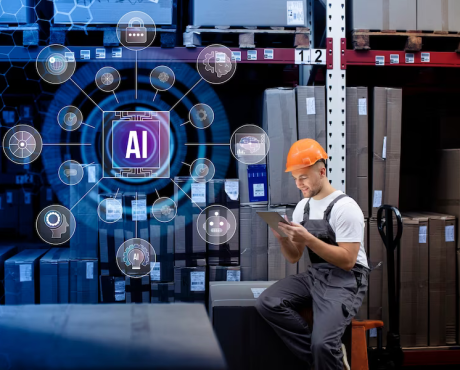Table of Contents
Predictive Maintenance: Enhancing Equipment Reliability
Robotic Process Automation: Streamlining Operations
Computer Vision: Ensuring Quality Assurance
Demand Forecasting: Optimizing Supply Chain Management
Warehouse Automation: Improving Efficiency
Challenges and Pitfalls of AI Adoption
Artificial Intelligence (AI) has emerged as a game-changer in the manufacturing industry, transforming traditional processes and paving the way for a more efficient and productive future. By harnessing the power of artificial intelligence in manufacturing, manufacturers can unlock new opportunities, streamline operations, and drive innovation. In this blog, we will explore the various ways AI is revolutionizing the manufacturing industry, including its benefits of AI in manufacturing and real-world artificial intelligence applications in manufacturing.
The manufacturing industry is no stranger to technological advancements. From the advent of automation to the rise of robotics, manufacturers have always sought innovative ways to enhance efficiency and productivity. However, with the introduction of AI, a new era has dawned upon the industry. AI, in conjunction with machine learning and deep learning algorithms, empowers manufacturers to analyze vast amounts of data, make informed decisions, and automate complex tasks.
The primary goal of AI in manufacturing is to optimize processes, reduce costs, and improve overall productivity. By leveraging AI technologies, manufacturers can gain valuable insights from data, predict equipment failures, automate repetitive tasks, and enhance product quality. Let’s delve into the key use cases of artificial intelligence use cases in manufacturing to understand its transformative potential.
Insights into AI in Manufacturing
Artificial Intelligence (AI) is revolutionizing the manufacturing industry by introducing automation, data-driven decision-making, and predictive capabilities that optimize production processes. By leveraging AI technologies, manufacturers can harness vast amounts of data from machines, sensors, and production lines to gain insights into performance, potential failures, and opportunities for process improvement. AI empowers manufacturers to move beyond traditional methods, enabling more efficient, faster, and cost-effective production workflows. Key areas where AI is making an impact include predictive maintenance, quality control, supply chain optimization, and demand forecasting. With AI, manufacturing companies are able to stay competitive in an increasingly digitalized world.
Predictive Maintenance: Enhancing Equipment Reliability
One of the most significant examples of AI in manufacturing is predictive maintenance. Traditionally, manufacturers relied on reactive or preventative maintenance strategies, which often led to unexpected downtime and higher costs. However, with the advent of artificial intelligence in manufacturing, manufacturers can now implement predictive maintenance, which leverages data analysis and machine learning algorithms to forecast equipment failures before they occur.
Predictive maintenance utilizes sensor data, historical maintenance records, and real-time monitoring to identify patterns and anomalies in equipment performance. By analyzing this data, AI algorithms can predict when a particular component is likely to fail, enabling manufacturers to schedule maintenance proactively. This approach not only minimizes unplanned downtime but also reduces maintenance costs and increases equipment reliability.
For example, a multinational automobile manufacturer implemented a predictive maintenance system in its assembly line. By analyzing sensor data from various machines, the artificial intelligence applications in manufacturing helped identify early signs of equipment malfunction and alert maintenance personnel to take preventive action. As a result, the company experienced a significant reduction in downtime, improved production efficiency, and cost savings.
How Is AI Used in Manufacturing?
AI is used in manufacturing across a wide range of applications to enhance efficiency, accuracy, and productivity. One of the most prominent uses is predictive maintenance, where AI algorithms analyze data from machines to predict failures before they happen, thus reducing downtime and maintenance costs. Robotic Process Automation (RPA) powered by AI automates repetitive tasks, allowing human workers to focus on higher-value activities. Additionally, AI-based computer vision systems are used for quality control, inspecting products for defects at a speed and accuracy far beyond human capabilities. Another key area is supply chain management, where AI helps forecast demand, optimize inventory, and manage logistics more effectively. AI is also increasingly used for demand forecasting by analyzing market trends, social media sentiment, and external factors like weather patterns.
Robotic Process Automation: Streamlining Operations
Robotic Process Automation (RPA) is another area where AI in manufacturing is transforming the industry. RPA involves the use of software robots or “bots” to automate repetitive and rule-based tasks, allowing human workers to focus on more complex and value-added activities. Artificial intelligence use cases in manufacturing like this allow manufacturers to enhance efficiency in operations.
By implementing RPA, manufacturers can streamline their operations, reduce errors, and improve overall productivity. Bots can work 24/7 without fatigue, ensuring continuous production and faster turnaround times. Moreover, RPA enables seamless integration between different systems and applications, eliminating the need for manual data entry and improving data accuracy.
A leading electronics manufacturer utilized RPA to automate its invoice processing system. The artificial intelligence in manufacturing helped the bots extract relevant data from invoices, validate the information, and update the company’s ERP system. This automation significantly reduced the time and effort required for invoice processing, improved data accuracy, and freed up employees to focus on more strategic tasks.
The Future of AI in Manufacturing
The future of AI in manufacturing looks incredibly promising, with advancements in machine learning, data analytics, and automation shaping the way industries operate. AI’s role in manufacturing will continue to grow as companies integrate more sophisticated technologies, such as edge computing and Internet of Things (IoT), enabling real-time decision-making on the production floor. With the rise of AI-driven smart factories, manufacturers will be able to monitor operations more efficiently, implement autonomous systems, and enhance product customization. AI-powered robots will become more autonomous, working collaboratively with human workers to increase production speed while maintaining high levels of safety. The future also points towards AI’s role in sustainability, as it can help manufacturers optimize energy consumption and reduce waste through intelligent resource management. Ultimately, the integration of AI in manufacturing will drive greater competitiveness, innovation, and profitability.
Computer Vision: Ensuring Quality Assurance
Ensuring product quality is of utmost importance in the manufacturing industry. Traditionally, quality assurance processes relied on manual inspections, which were time-consuming, subjective, and prone to errors. However, with the advent of computer vision, artificial intelligence applications in manufacturing can now automate the quality inspection process using AI algorithms and image recognition techniques.
Computer vision systems analyze digital images or videos of products to detect defects, irregularities, or deviations from the desired specifications. Examples of AI in manufacturing include using these techniques to improve quality control in sectors like pharmaceuticals or electronics, ensuring more consistent results.
AI in Manufacturing Examples: Big Cases
There are numerous examples of AI in manufacturing that showcase the transformative power of AI technologies. One notable case is that of a global automobile manufacturer that implemented AI-powered predictive maintenance across its production lines. By utilizing data from sensors embedded in machinery, AI was able to predict equipment failures before they happened, reducing unplanned downtime by 30% and significantly cutting repair costs. Another example is in the electronics industry, where robotic process automation (RPA) has been used to automate inventory management, drastically improving supply chain efficiency and reducing human error. In the consumer goods industry, AI-driven demand forecasting models have been successfully deployed to predict consumer buying patterns, enabling companies to optimize production schedules and inventory management. Additionally, computer vision technology is being used in pharmaceutical manufacturing to ensure the quality of pills and other medical products, detecting defects or inconsistencies in real-time. These big cases demonstrate the versatility of AI in different sectors and its potential to streamline operations, reduce costs, and improve product quality.
Demand Forecasting: Optimizing Supply Chain Management
Accurate demand forecasting is crucial for manufacturers to optimize production, inventory management, and supply chain operations. Traditionally, demand forecasting relied on historical sales data, market trends, and manual analysis, which often led to inaccurate predictions and inefficiencies. However, with AI-powered demand forecasting models, manufacturers can leverage advanced analytics and machine learning algorithms to predict future demand more accurately.
AI algorithms can analyze a wide range of data sources, including sales data, customer behavior, market trends, social media sentiment, and external factors such as weather conditions or economic indicators. By considering multiple variables and patterns, artificial intelligence use cases in manufacturing can generate more accurate demand forecasts, enabling manufacturers to optimize production schedules, inventory levels, and supply chain logistics.
A global consumer goods manufacturer implemented an AI-based demand forecasting system that utilized machine learning algorithms and big data analytics. The system analyzed historical sales data, market trends, weather patterns, and promotional activities to generate accurate demand forecasts for different product categories and geographical regions. This enabled the company to optimize production, reduce excess inventory, and improve overall supply chain efficiency.
Warehouse Automation: Improving Efficiency
Warehouse operations play a critical role in the manufacturing industry, encompassing tasks such as inventory management, order fulfillment, and logistics. Traditionally, these operations relied on manual labor, which was time-consuming, error-prone, and susceptible to inefficiencies. However, with the advent of AI and robotics, manufacturers can automate warehouse operations, improving efficiency, accuracy, and productivity.
AI-powered robots, equipped with computer vision and machine learning capabilities, can navigate warehouse environments, pick and pack products, and optimize inventory management. These robots can work collaboratively with human workers, complementing their skills and reducing the risk of errors. By automating repetitive and labor-intensive tasks, manufacturers can significantly increase throughput, reduce costs, and improve overall warehouse efficiency.
For example, a leading e-commerce company implemented AI-powered robots in its fulfillment centers to automate order picking and packing processes. The robots, guided by computer vision systems, navigated through the warehouse, identified the required products, and delivered them to human workers for packaging. This automation not only increased order processing speed but also reduced errors and improved customer satisfaction.
Challenges and Pitfalls of AI Adoption
While AI offers immense potential for the manufacturing industry, there are challenges and pitfalls that manufacturers need to be aware of when adopting AI technologies. Some of the key challenges include:
- Data Quality and Availability: AI algorithms rely on high-quality, relevant, and diverse data to provide accurate insights and predictions. Manufacturers need to ensure they have access to clean and reliable data to train AI models effectively.
- Integration and Compatibility: Integrating AI systems with existing infrastructure and legacy systems can be complex and challenging. It is crucial for manufacturers to plan and execute a seamless integration strategy to leverage the full potential of AI technologies.
- Skills and Expertise: Implementing AI technologies requires specialized skills and expertise. Manufacturers need to invest in training their workforce or partnering with AI solution providers to ensure proper adoption and utilization of AI technologies.
- Ethical and Privacy Concerns: AI technologies raise ethical and privacy concerns, especially when it comes to handling sensitive data or making autonomous decisions. Manufacturers need to prioritize data security, transparency, and ethical AI practices to build trust with their customers and stakeholders.
- Cost and Return on Investment: Implementing AI technologies can involve significant upfront costs, including infrastructure, software, and talent acquisition. Manufacturers need to carefully evaluate the potential return on investment and long-term benefits of AI adoption.
While there are challenges and pitfalls to navigate, manufacturers can harness the power of AI by addressing these challenges, manufacturers can unlock the full potential of AI and reap its benefits in terms of improved efficiency, productivity, and competitiveness.
FAQs Related to Artificial Intelligence in Manufacturing
How does AI benefit the manufacturing industry?
AI in manufacturing brings positive impacts of manufacturing technology by enhancing productivity, reducing operational costs, and improving quality control through automation and data analytics.
How AI will revolutionize manufacturing?
AI will revolutionize manufacturing by streamlining operations, automating routine tasks, and providing manufacturing information system advantages and disadvantages to optimize production and enhance overall efficiency.
How artificial intelligence is revolutionizing industries?
Artificial intelligence applications in manufacturing are making a significant impact across industries, from predictive maintenance and robotic automation to improving supply chain forecasting and product quality control.





